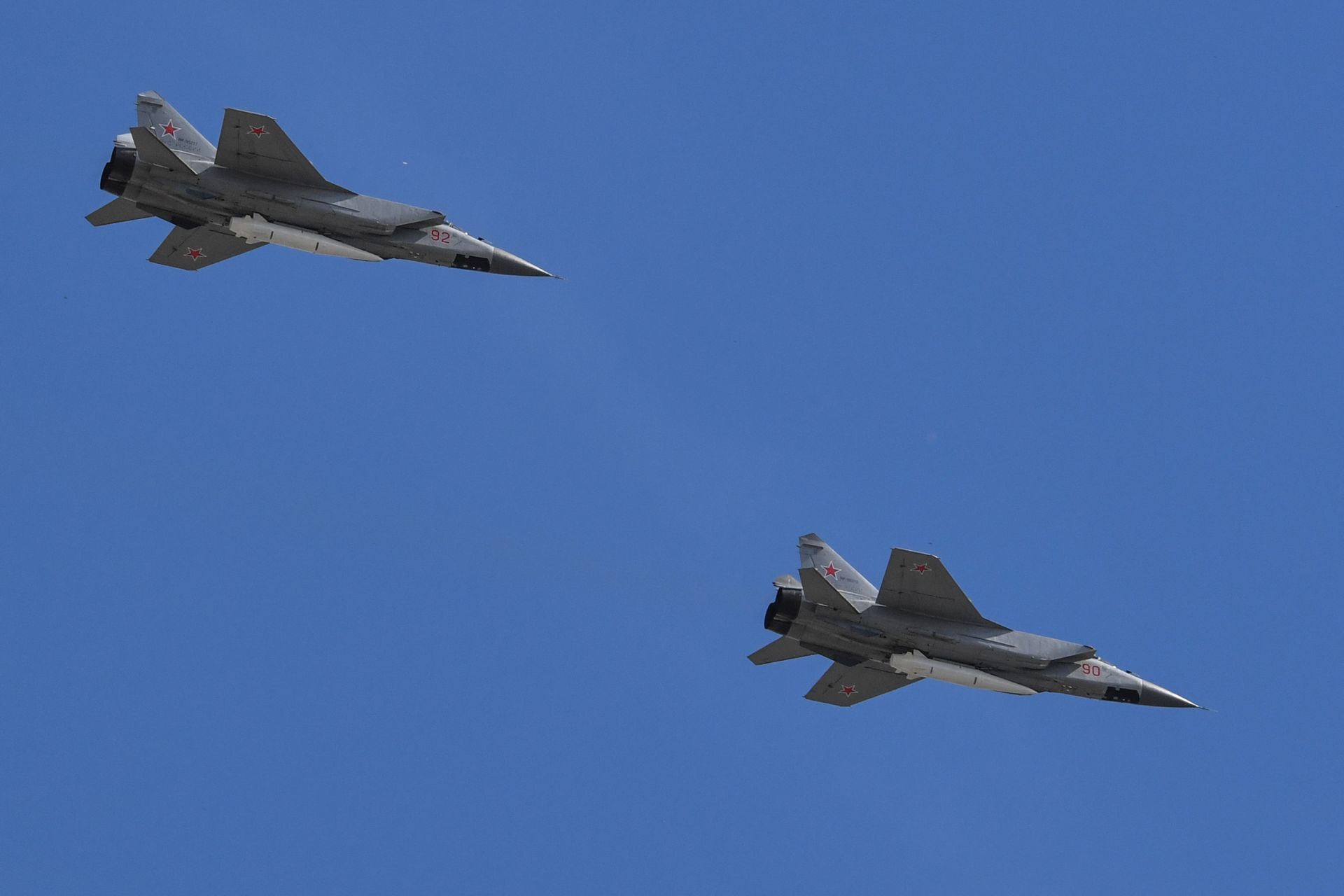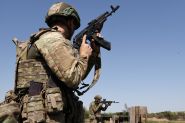- Home
- Middle East
- NATO Intercepts Russian MiGs in Estonian Airspace as Tallinn Calls for Article 4 Talks

Russia's MiG-31 supersonic interceptor jets carrying hypersonic Kinzhal (Dagger) missiles fly over Red Square during the Victory Day military parade in Moscow on May 9, 2018. ©Yuri Kadobnov / AFP
Three Russian MiG-31 fighters violated Estonian airspace over the Gulf of Finland on Friday, Estonia said, triggering complaints of a dangerous new provocation from the EU and NATO.
Italian F-35 fighters attached to NATO's air defense support mission in the Baltic states were scrambled to intercept the Russian jets and warn them off, Estonian and Italian officials said.
"Three Russian MiG-31 fighter jets entered Estonian airspace in the Vaindloo Island area without permission and remained there for approximately 12 minutes," the Estonian defense forces said.
"The fighter jets did not have flight plans, and their transponders were switched off. At the time of the airspace violation, the fighter jets did not have two-way radio communication with Estonian air traffic control."
NATO spokesperson Allison Hart said, "This is yet another example of reckless Russian behavior and NATO's ability to respond."
There was no immediate reaction from Moscow.
The EU's top diplomat, Kaja Kallas, a former Estonian prime minister, accused Moscow of an "extremely dangerous provocation" and warned that the sortie "further escalates tensions in the region."
Estonia’s Prime Minister Kristen Michal said his government would request urgent NATO talks under Article 4 of the alliance treaty following the violation.
"Such violation is totally unacceptable. The Government of Estonia has decided to request NATO Article 4 consultations," Michal wrote on X.
Under Article 4, a NATO member can convene urgent talks when it feels its "territorial integrity, political independence, or security" is at risk.
"As threats escalate, so too will our pressure," said European Commission chief Ursula von der Leyen, who earlier in the day had presented for EU member state approval a 19th package of sanctions targeting Moscow over the Ukraine war.
Italy assumed command of the NATO Baltic Air Policing mission – Operation Baltic Eagle III – on August 1, with the Italian air force's F-35 aircraft taking responsibility for surveillance of Baltic airspace.
The alleged incursion came at a moment of heightened tension on NATO's eastern border, after Poland last week complained that around 20 Russian drones overflew its territory.
Moscow denied Poland was targeted.
Russia is fighting a war in Ukraine and often tests Western air defenses, but Estonia complained that the sorties have become more provocative in recent months.
"Russia has already violated Estonia's airspace four times this year, which in itself is unacceptable. But today's incursion... is unprecedentedly brazen," Foreign Minister Margus Tsahkna said.
Readiness Tested
"Russia's increasingly extensive testing of boundaries and growing aggressiveness must be met with a swift increase in political and economic pressure," he said.
Tsahkna said Russia's chargé d'affaires in Estonia had been summoned to the foreign ministry to receive a formal complaint.
Earlier this month, Estonia complained that a Russian MI-8 helicopter had violated its airspace, also near the island of Vaindloo.
According to the Estonian defense forces, the helicopter entered the country's airspace for about four minutes without making contact with air traffic control.
It also did not have a flight plan, its transponder was turned off, and it did not communicate with Estonian air traffic control. Similar incidents occurred on May 13 and June 22.
Last week, Poland and its Italian and Dutch NATO allies scrambled jets to intercept what were around 20 Russian drones prowling its airspace. Some of them were shot down.
The UK, Germany, and France announced plans to reinforce joint air patrols with more jets based on NATO's eastern flank.
Several more NATO allies complained Friday about the latest alleged incursion.
Sweden's Prime Minister Ulf Kristersson posted on social media that the incident "illustrates the seriousness of the Russian threat to European security and the fact that our and NATO's readiness is constantly being tested."
AFP
Read more



Comments